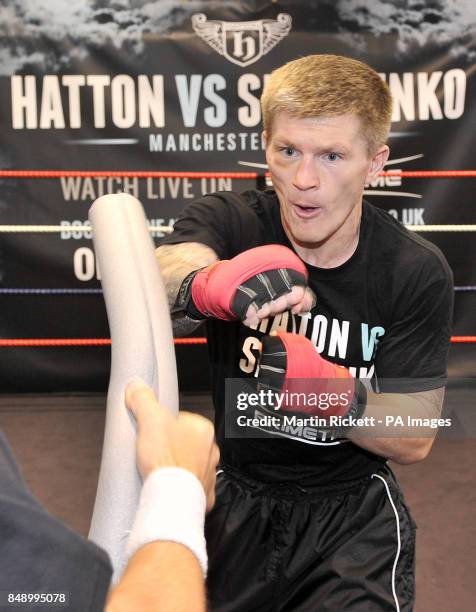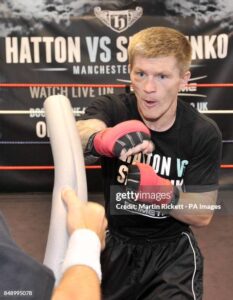
The Haunting Echo: Ricky Hatton’s Final Moments Frozen in Glory

In the dim glow of a Manchester morning on September 14, 2025, the world of boxing lost one of its most beloved warriors. Ricky Hatton, the indomitable “Hitman” whose fists once thundered through arenas from Hyde to Las Vegas, was found dead at his home in Gee Cross, Hyde, at the age of 46. Greater Manchester Police confirmed the discovery, stating there were no suspicious circumstances surrounding the death of the former world champion. But as tributes poured in from fellow fighters, celebrities, and an army of fans who once chanted his name like a battle cry, one detail emerged that pierced the heart of the narrative: Hatton was reportedly discovered with his television still flickering, frozen on a replay of one of his own iconic fights. Fans, reeling from the shock, have taken to social media calling it “haunting,” a poignant symbol of a man forever tethered to the ring that both exalted and exhausted him.
The image is almost cinematic in its tragedy—a lone figure, slumped in the quiet of his living room, eyes perhaps glazing over one last time at the grainy footage of his younger self, sweat-slicked and snarling, delivering body shots that crumpled opponents like paper. Whispers among close friends and early reports suggest the fight paused on screen was his legendary 2005 demolition of Kostya Tszyu, the night “The Pride of Hyde” claimed the IBF light-welterweight title in a Manchester cauldron of 20,000 roaring supporters. That bout, a 11th-round stoppage where Hatton broke down the unbeaten Australian-Russian legend, wasn’t just a victory; it was a coronation. Tszyu, 35 and undefeated in 31 fights, quit on his stool, his corner throwing in the towel as Hatton’s relentless pressure proved too much. “Not only did he beat him, he broke him,” Sky Sports Boxing later reflected in a tribute clip that went viral post-tragedy. To fans, the frozen replay feels like a ghost story: Hatton, the eternal fighter, caught in a loop of his own immortality, as if the ring had reclaimed him in solitude.
Ricky Hatton wasn’t born to fade quietly. Emerging from the council estates of Hattersley in Greater Manchester, he turned pro in 1997 at 18, a stocky kid with a puncher’s hunch and a fan’s heart. His amateur pedigree was solid—three ABA titles—but it was in the paid ranks where he became a phenomenon. Hatton’s style was raw poetry: pressure fighting laced with vicious hooks to the body, a willingness to absorb punishment for the sake of spectacle. He ballooned to 180 pounds between camps, earning the affectionate moniker “Ricky Fatton” from supporters who saw in him a mirror of their own indulgences. “We all laughed at Ricky Fatton but it was a miracle I got away with it so long,” he admitted years later in a Guardian interview, reflecting on the criminal toll his lifestyle exacted on his frame.
By 2005, Hatton was a force. His unification of the light-welterweight division came against Carlos Maussa in November that year, another brutal stoppage where he wrested the WBA belt in the ninth round. But it was Tszyu that etched him into legend. The fight, held at the MEN Arena, drew a crowd that turned the venue into a blue sea of Manchester City scarves—Hatton was as much a football ultras’ hero as a boxing king. Promoter Frank Warren called it “one of the greatest nights in British boxing history.” Post-fight, Hatton, drenched in sweat and champagne, lifted the belt to chants of “There’s only one Ricky Hatton,” a tune borrowed from “Winter Wonderland” that would become his anthem. That moment, replayed endlessly on TV, captured the essence of Hatton: not just awinner, but a conductor of communal ecstasy.
The frozen TV detail, though unconfirmed by family in official statements, spread like wildfire across social media. On X (formerly Twitter), users dissected it with a mix of grief and reverence. “If true, it’s the most heartbreaking image—Ricky reliving his glory, alone with the ghosts of the ring,” wrote one fan, @BoxingFanatic87, in a thread that garnered thousands of likes. Another, @HydePrideForever, posted a screenshot of the Tszyu fight replay: “Haunting. Like he was watching his life flash before him. 💔 #RIPHitman.” The speculation tied into Hatton’s well-documented nostalgia; he often spoke of missing the roar of crowds, the electric hum of fight night. In a 2013 Manchester Evening News interview, he confessed, “I think about it every day, whenever there’s a clip on TV… I miss it.” Just days before his death, Hatton had shared gym workout videos on Instagram, hyping a planned comeback bout in Dubai this December against an unnamed opponent. “Back in the mix,” he captioned one, fists wrapped, shadowboxing with the fire of his 20s.
Yet beneath the bravado lurked shadows Hatton confronted publicly. His 2007 superfight against Floyd Mayweather Jr. in Las Vegas was a high-water mark turned heartbreak. Over 30,000 British fans invaded the MGM Grand, draining the arena’s beer supply and belting out Hatton’s song even as he was stopped in the 10th round. “I got to rock bottom” after that, Hatton told the BBC in 2022, the defeat spiraling him into depression, cocaine addiction, and suicidal ideation. “I wanted to drink and drug myself to death,” he revealed in the 2023 documentary Hatton, a raw unflinching look at his battles. The film, directed by Sophie Peachey, showed a man piecing himself together—therapy, sobriety stints, fatherhood to his four children. His 2022 exhibition against old rival Marco Antonio Barrera in Manchester was cathartic; Hatton won a unanimous decision, emerging teary-eyed: “This moment is up there with the best!”

Tributes after his passing painted a mosaic of love and loss. Wayne Rooney, who once carried Hatton’s belts into the ring, tweeted, “Devastated… a legend, a warrior and a great person.” Liam Gallagher of Oasis, who walked Hatton out against Paulie Malignaggi in 2008, posted: “Absolutely devastated… an absolute honour to know him.” Manny Pacquiao, who knocked Hatton out cold in 2009—another devastating KO that left the Brit floored for minutes—wrote, “Deeply saddened… He was not only a great fighter inside the ring but also a brave and kind man in life.” Even Piers Morgan chimed in: “RIP Ricky ‘The Hitman’ Hatton, 46. Found dead at his home in Manchester.” Radio host Paddy McGuinness choked up on BBC Radio 2, playing “Blue Moon”—Hatton’s walkout tune and Manchester City anthem—before murmuring, “World Champion.”
Boxing’s elder statesmen echoed the sentiment. Amir Khan, a fellow Mancunian champ, called him “a friend, a mentor, a warrior.” Promoter Eddie Hearn remembered Hatton’s fan pull: “Tens of thousands followed him to Vegas… He turned boxing into a party.” On Reddit’s r/Boxing, a thread exploded with 5,000 upvotes: “Hatton will be remembered above just boxing fans… The UK fans are some of the best.” Users shared clips of his vicious body-shot KOs—Ayub Kalule in 2000, Jon Thaxton the same year—marveling at the “electric nights in Manchester.” One poster nailed the duality: “He drank too much, ate too much, liked a good time. The only difference was he was born to fight.”
The haunting TV detail amplifies Hatton’s duality: the joyful brawler who partied like a fan, and the tormented soul who couldn’t escape the canvas. In his Wikipedia entry, updated post-mortem, it’s noted he hosted Ricky Speaks on Nuts TV in 2008, chatting with guests about life’s highs and lows—foreshadowing his later advocacy. His family issued a statement via the Manchester Evening News: “We are heartbroken… Ricky’s legacy will live on.” They requested privacy, but the outpouring continued—flowers piled at his Bowlacre Road home, murals sketched in Hyde gyms.
As September 26, 2025, marks twelve days since his passing, the boxing world pauses. Queensberry Promotions shared a clip of the Tszyu fight: “There’s only one Ricky Hatton 🩵.” TalkSPORT’s Fight Night devoted an hour to highlights, Gareth Davies calling it “the best night of boxing I’ve ever been at.” Donald McRae, in The Guardian, evoked sparring memories: “Only the memories of Mike Tyson… can rival the vivid images I carry of the young Ricky Hatton. He was utterly lost in boxing. Pure.”
Hatton’s death isn’t just a loss; it’s a mirror. In an era of polished influencers, he was unfiltered—flawed, fierce, forever the people’s champ. That frozen replay? Perhaps it’s the ultimate tribute: a life paused at its peak, reminding us glory is fleeting, but its echo endures. As fans chant in digital vigils, “There’s only one Ricky Hatton.” And in Manchester’s misty mornings, they’ll always hear it.


